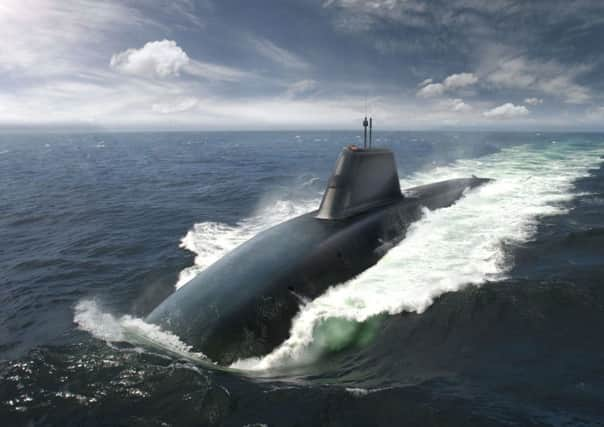Trident report: UK at risk from nuclear attack


The prospect of the UK falling victim to a future nuclear attack is still “sufficiently uncertain” to make the submarine-based weapons system necessary, the cross-party Trident commission has found.
But the SNP-led Scottish Government has restated its opposition to Trident and warned the weapons will have to be removed from Scotland in the event of a Yes vote in September’s independence referendum.
Advertisement
Hide AdAdvertisement
Hide AdThe UK government will decide whether to renew Trident, at a cost of £15bn-£20bn in 2016. The Conservatives are committed to like-for-like replacement of the existing four-submarine fleet, but the Liberal Democrats say they would only build three new subs.
The commission report, published yesterday, said the UK should retain and deploy a nuclear arsenal for reasons of national security and its responsibilities to Nato.
However, it also said that relaxing continuous at sea deterrence, where one submarine is always at sea, might be considered.
The commission report states: “If there is more than a negligible chance that the possession of nuclear weapons might play a decisive future role in the defence of the United Kingdom and its allies in preventing nuclear blackmail, or in affecting the wider security context within which the UK sits, then they should be retained.
“The impact of the UK’s falling victim to ongoing strategic blackmail or nuclear attack is so significant that, even if the chances appear slim today, there is sufficient uncertainty surrounding the prospect that it would be imprudent to abandon systems that have a high capacity to counter such threats.”
It added that the country should show keen regard for the shared responsibility to work towards global nuclear disarmament.
Commission members include former Conservative defence secretary Sir Malcolm Rifkind, ex-Liberal Democrat leader Sir Menzies Campbell, former chief of the defence staff Lord Guthrie of Craigiebank and ex-Labour defence secretary Lord Browne. It was set up in 2011 by the British American Security Information Council.
The threats to the UK could come from the re-emergence of a nuclear state with an “aggressive posture”, as well as a nuclear state attaining global reach and entering into direct strategic competition with the UK. A state acquiring bio-weapons or comparable mass destruction technologies is also a threat.
Advertisement
Hide AdAdvertisement
Hide AdThe current plans to construct and deploy four submarines with missiles and warheads over the period 2016 to 2062 will account for 9.4 per cent of the defence budget, the report said.
Deputy First Minister Nicola Sturgeon said: “The Scottish Government position is that Trident should be removed from an independent Scotland by 2020.
“September’s referendum is an opportunity to remove Trident from Scotland before we are hit with a share of the further £100bn in costs estimated for the lifetime of the proposed successor system.”